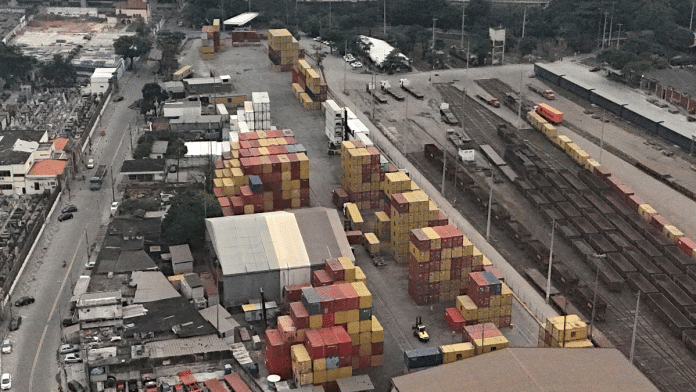Brasilia: U.S. President Donald Trump on Wednesday slapped a 50% tariff on most Brazilian goods to fight what he has called a “witch hunt” against former President Jair Bolsonaro, but softened the blow by excluding sectors such as aircraft, energy and orange juice from heavier levies.
Trump announced the tariffs, some of the steepest levied on any economy in the U.S. trade war, as his administration also unveiled sanctions on the Brazilian supreme court justice who has been overseeing Bolsonaro’s trial on charges of plotting a coup.
“Alexandre de Moraes has taken it upon himself to be judge and jury in an unlawful witch hunt against U.S. and Brazilian citizens and companies,” Treasury Secretary Scott Bessent said in a statement.
Bessent said Moraes “is responsible for an oppressive campaign of censorship, arbitrary detentions that violate human rights, and politicized prosecutions — including against former President Jair Bolsonaro.”
Last week, the Brazilian justice levied search warrants and restraining orders against Bolsonaro over allegations he courted Trump’s interference in his criminal case, in which he is accused of plotting to stop President Luiz Inacio Lula da Silva from taking office in 2023.
Trump’s final tariff order and the sanctions followed weeks of sparring with Lula, who has likened the U.S. president, a close ideological ally of Bolsonaro’s, to an unwanted “emperor.”
On Wednesday, Lula and his government closed ranks behind Moraes, calling the U.S. sanctions “unacceptable.”
“The Brazilian government considers the use of political arguments to defend the trade measures announced by the U.S. government against Brazilian exports to be unjustifiable,” it said in a statement.
Lula added that Brazil was willing to negotiate trade with the U.S., but that it would not give up on the tools it had at hand to defend itself, hinting that retaliation was possible.
Still, Trump’s tariff order threatened that if Brazil were to retaliate, the U.S. would also up the ante.
DIPLOMACY AT WORK
Despite Trump’s effort to use the tariffs to alter the trajectory of a pivotal criminal trial, the range of exemptions came as a relief for many in Brasilia, who since Trump announced the tariff earlier this month had been urging protections for major exporters caught in the crossfire.
“We’re not facing the worst-case scenario,” Brazilian Treasury Secretary Rogerio Ceron told reporters.
The new tariffs will go into effect on August 6, not on Friday as Trump announced originally.
Trump’s executive order formalizing a 50% tariff excluded dozens of key Brazilian exports to the United States, including civil aircraft, pig iron, precious metals, wood pulp, energy and fertilizers.
Planemaker Embraer, whose chief executive has met with officials in Washington and U.S. clients in recent days to plead its case for relief, said an initial review indicated that a 10% tariff imposed by Trump in April remains in place, with the exclusion applying to the additional 40%.
The exceptions are likely a response to concerns from U.S. companies, rather than a step back from Trump’s efforts to influence Brazilian politics, said Rafael Favetti, a partner at political consultancy Fatto Inteligencia Politica in Brasilia.
“This also shows that Brazilian diplomacy did its work correctly by working to raise awareness among U.S. companies,” he said.
Brazil’s minister of foreign affairs, Mauro Vieira, said he met with U.S. Secretary of State Marco Rubio on Wednesday to express the nation’s willingness to discuss tariffs after negotiations stalled in June, though he stressed Bolsonaro’s legal troubles were not up for debate.
It remains unclear what Brazilian authorities “are bringing to the negotiating table to, for instance, open the domestic market,” Goldman Sachs said in a note to clients.
IMPACT SMALLER THAN EXPECTED
The effective tariff rate on Brazilian shipments to the U.S. should be around 30.8%, lower than previously expected due to the exemptions, according to Goldman.
Oil shipments to the U.S., which had been suspended, are set to restart after being spared, lobby group IBP said. Meanwhile, mining lobby Ibram said the exemptions covered 75% of mining exports.
However, it was still too soon to celebrate, said former Brazilian trade secretary Welber Barral, estimating that Brazil exports some 3,000 different products to the United States.
“There will be an impact,” Barral said.
Trump’s tariff exemptions did not shield two of Brazil’s key exports to the U.S., beef and coffee.
Meatpackers expect to log $1 billion in losses in the second half of the year on the new tariffs, lobby group Abiec, which represents beef producers including JBS and Marfrig, said.
Coffee exporters will also continue to push for exemptions, they said in a statement.
The government said it was readying measures to protect Brazil’s businesses and workers.
If Brazil were to retaliate against Trump’s measures, that “would generate a larger negative impact” on activity and inflation, Goldman said.
“The political inclination may be to retaliate, but exporters and business associations have been urging the Brazilian administration to engage, negotiate and de-escalate.”
This report is auto-generated from Reuters news service. ThePrint holds no responsibility for its content.






